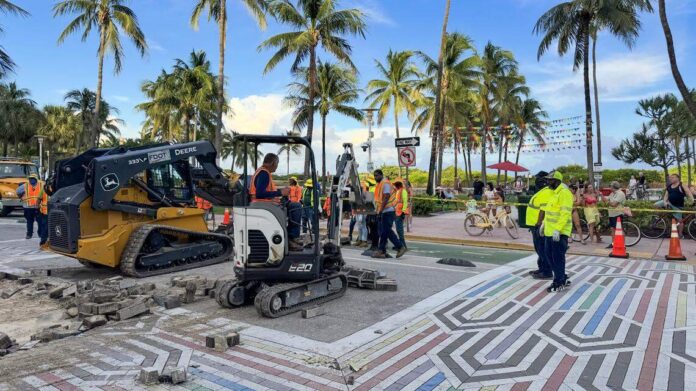The Florida government oversaw the removal of the rainbow crosswalk in Miami Beach, following a state order requiring the removal of all street art from public streets. The action was carried out just days after the city of Miami Beach exhausted appeals, The Associated Press reported.
Florida Department of Transportation personnel began removing the multicolored paving stones at the iconic Ocean Drive intersection Sunday afternoon. By the end of the day on Monday, October 6, the traditional crosswalk, installed in 2018 as a tribute to the history and contributions of the LGBTQ+ community, had been completely covered with asphalt. Featured in numerous travel guides, the crossing was considered a symbol of visibility and diversity.
According to the AP, Miami Beach Commissioner Alex Fernandez explained that city employees stored the removed paving stones for future commemorative projects.
“This represented decades of people experiencing housing discrimination, military discharge, employment discrimination, the stigma of HIV and AIDS, and the fight for marriage equality. All battles that allowed the LGBTQ community to move from marginalization to recognized visibility,” the official noted, according to the agency.
The removal of the crossing, installed in 2018 and designed in the Art Deco style, responded to a state order prohibiting all street art in public spaces. (Rob O’Neal/Florida Keys News Bureau/REUTERS)
The crosswalk, designed by architects Savino & Miller Design Studio, was distinguished by its colorful terrazzo pattern, evoking the Art Deco style, which has been present in the city for nearly a century. According to Fernandez, “The design meets federal guidelines and is one of the safest crossings in the area, recording half the number of accidents compared to the next closest crossing since 2018.”
The removal order came from the state Department of Transportation under Governor Ron DeSantis’ administration. According to the news agency, the official warning included withholding state transportation funding for any noncompliance.
The Associated Press emphasizes that this measure is part of a series of policies by the Republican administration, including restrictions on access to gender-affirming care and the passage of the “Don’t Say Gay” law, which restricts the coverage of sexual orientation and gender identity issues in Florida’s public schools.
DeSantis defended the order in a previous statement: “I think the art on the pavement has gone too far. It’s better that we use the streets and intersections for their intended purpose.” The agency notes that the directive also affected other street murals not dedicated exclusively to historically marginalized groups. A police support mural, titled “Back the Blue,” located in front of the main police headquarters in Tampa, was also removed.
The removal of themed crosswalks in Florida is not new. Among the list of removals, the agency cites the case of a rainbow crossing installed in honor of the 49 victims of the 2016 shooting at the Pulse Nightclub in Orlando. That crossing was painted black and white by state workers overnight, after community groups restored the original colors following the initial paint removal.
LGBTQ+ rights organizations and critics of state policies accuse the state administration of carrying out further attacks on civil rights under the guise of traffic regulations. “This is yet another blow to the community,” lamented a local resident during the removal efforts, quoted by The Associated Press.






